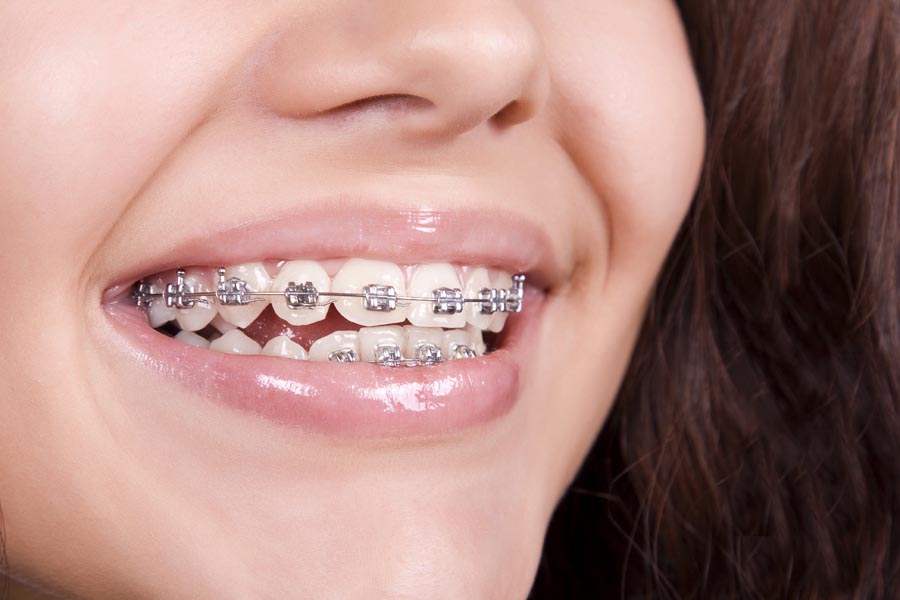When you have braces, it may seem like nothing is more difficult than keeping them properly clean. The braces themselves often act as a physical barrier in between you and your teeth, making it almost impossible to clean both them and your teeth properly. Keeping your braces clean, however, is extremely important when it comes to keeping your mouth as clean as it can possibly be. Here’s how to keep your braces clean:
1. Choose the right toothbrush.
The toothbrush you were using before you got braces is probably not going to be adequate anymore. While a standard toothbrush will work, there are a few better options that will make getting your teeth clean much easier. For example, an electric toothbrush is a good option. You might also look into brushes that are made specifically for cleaning around braces. Spindle brushes can help to remove food from in between your teeth and the braces, as well as from in between individual teeth.
2. Start by brushing the exterior surface of your teeth.
This is the surface of your teeth to which your braces are probably adhered and the side that people see when you smile. This is where plaque will be the most noticeable, especially on the braces, but is not necessarily where it will do the most damage. Start by brushing underneath the braces, removing particles of food and plaque from the area below the brackets. Then, brush above the brackets and try to get as much of the tooth in between the brackets and beneath the wire as possible. Slanting the brush will help you get it into a more ideal position for cleaning underneath the wire.
3. Then, brush the inside of your teeth.
This area and the bite surface of your teeth will be much easier to brush and you can probably just brush them normally, giving special attention to the backs and sides of your teeth, using circular motions to clear away any plaque that has gathered there. Though this area of your teeth is going to be easier to brush, do not slack off and give these surfaces a quick once over with your brush. Give them just as much time and attention as the surfaces of your teeth that do have braces attached.
4. Follow up with flossing.
Flossing probably seems impossible, as you have wires obstructing the gaps in between your teeth. It is, however, extremely important when you are wearing braces. There are several ways that you can floss in between your teeth, including using plain old floss and your fingers. It may take a little extra time to thread your floss around the wire, but it is worth the effort if you want to keep your teeth clean. There are actually a number of other options that could be much easier than using traditional floss. For example, floss picks, which are essentially small pieces of floss on the end of a plastic stick, can be very useful for quickly and easily getting in between your teeth. A water flosser is probably the easiest option for those who with braces, as it simply pushes water through the gaps between your teeth, quickly and easily removing food particles and plaque.
5. Use mouthwash.
Especially when you first get your braces in Hatboro, it is important to use mouthwash. Your mouth will not be used to the metal brackets and wires and these areas are more likely to collect food particles and plaque than other areas of your mouth, which could affect your breath and your overall oral health. Using mouthwash after brushing and flossing is a good way to support the health of your teeth and to kill any remaining bacteria that might be lurking in your mouth. It can also help to prevent bad breath from becoming an issue. Look for a mouthwash that contains fluoride and follow the instructions on the bottle.
6. Gargle with salt water.
This is likely something that your orthodontist has asked you to do when you first get your braces on, until the initial soreness is gone. A salt water gargle can help to reduce inflammation, combat pain or soreness, and keep your teeth clean. While you may not want to include this in your daily routine, using it after your braces are first put on or after an adjustment, when your teeth and jaw are sore, could help to keep your mouth healthy and your teeth clean.
7. Rinse your toothbrush and change it regularly.
Before you start brushing and after you have finished brushing, make sure that you rinse off your toothbrush. This prevents any food pieces from getting stuck in the bristles, where it can then breed bacteria that will make it difficult to keep your mouth clean. You should also get an entirely new toothbrush once every three months, especially when you are wearing braces, as the metal will usually wear out a toothbrush much faster than just your teeth will.
8. Watch your diet.
One of the best ways to keep your braces clean is to follow the dietary instructions given to you by Drs. Pale, Gemmi, and Middleberg. You may be asked to give up some of your favorite food while wearing braces, but staying away from these foods will help prevent serious issues with your braces. Sticky foods especially should be avoided, as these could adhere to the metal and will be very difficult to clean off. Avoid popcorn, chips, caramel, corn on the cob, etc.




